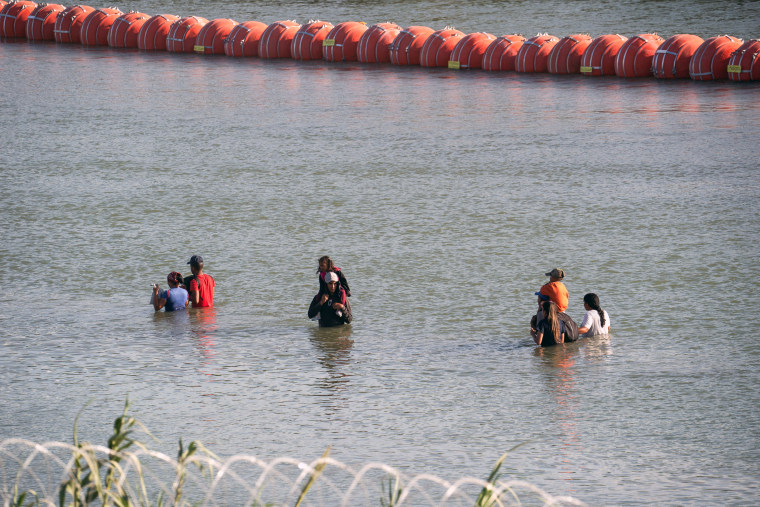A federal appeals court on Friday ordered Texas to remove a floating barrier from the Rio Grande placed there under the direction of Republican Gov. Greg Abbott to deter illegal migrant crossings.
In a 2-1 decision, the U.S. Court of Appeals for the 5th Circuit upheld a lower court’s finding that the buoys were illegal.
Judge Dana M. Douglas, a Biden appointee, wrote that the lower court “considered the threat to navigation and federal government operations on the Rio Grande, as well as the potential threat to human life the floating barrier created.”
“The district court’s factual findings were not clearly erroneous,” Douglas wrote.
Judge Don Willett, a Trump appointee, wrote the dissenting opinion.
Abbott responded to the ruling in a post on X, calling the decision “clearly wrong,” adding that he would “seek an immediate rehearing by the entire court” and go the the Supreme Court “if needed to protect Texas from Biden’s open borders.”
The Justice Department did not immediately respond to a request for comment.
The court’s decision comes amid a lengthy battle between Abbott and the Biden administration over a floating 1,000-foot barrier near Eagle Pass.
The appeals court had temporarily put on hold a judge’s order in September requiring Abbott to remove the barrier from the middle of the Rio Grande after finding that it posed a threat to human life, and that “impairment to free and safe navigation” outweighed the state’s interest in installing the buoys.
In a civil lawsuit this year, the Justice Department said that Abbott violated a federal law that prohibits creating any obstruction to the navigable capacity of the country’s waters without authorization when he ordered the installation of the barrier.
Attorneys for Texas had argued that the U.S. Constitution afforded the state the power to “repel invasions,” including the illegal entry of thousands of migrants.
The floating barrier is part of a broader fight Texas has waged against the Biden administration over its immigration policy.
Abbott sent a letter sent to President Joe Biden in July accusing the administration of impeding his state’s “sovereign interest” in securing its border. His office has repeatedly touted the busing of thousands of migrants out of his state since last year to cities like Washington, D.C., New York, Chicago, Philadelphia, Denver and Los Angeles.
Abbott vowed again this week to continue the busing effort, writing on X that “Texas will bus migrants to sanctuary cities until Biden secures the border.”
Some of the state’s other border tactics have been dealt legal setbacks.
A federal court this week rejected an effort by Texas to block U.S. Customs and Border Protection from removing razor wire near the Rio Grande. Abbott had ordered the wire to be placed there to stop migrants from entering the state after crossing the river from Mexico.
